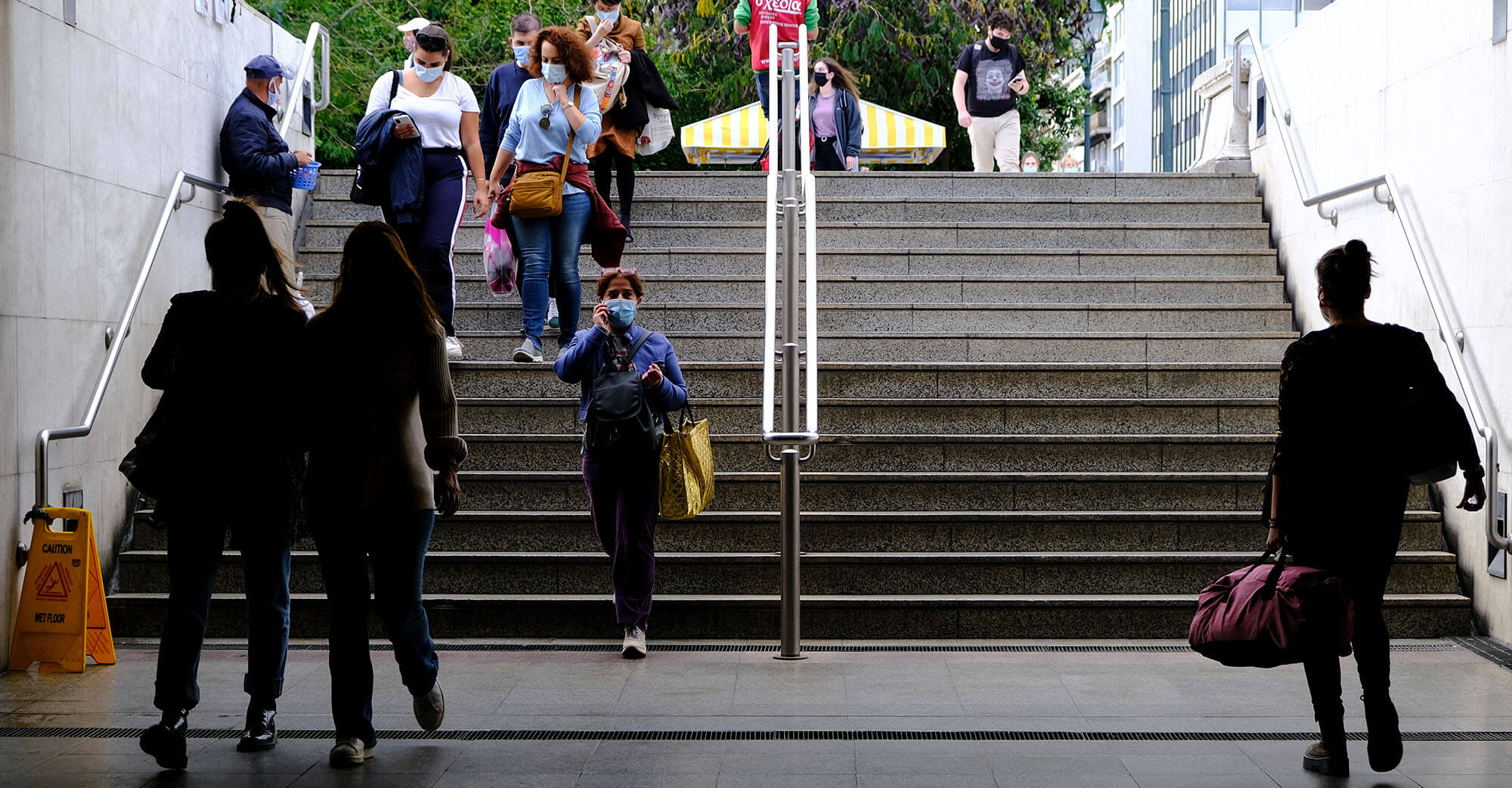From the onset of the new coronavirus pandemic, diaNEOsis has closely monitored and studied the various manifestations and repercussions of this phenomenon; as well as the crises it has caused in our economy and society at large. In addition to our articles and research analysis, beginning in April 2020 we have introduced a series of surveys, in an attempt to establish the views and attitudes of Greek citizens —and to charter how they have evolved and changed throughout the various phases of the pandemic. This surveying began during a "strict" lockdown in the early pandemic stages, and then continued throughout the consecutive phases of the pandemic: the challenging autumn and winter of '20, the arrival of vaccines; the lifting of harsh measures in the spring of '21—and finally, the recent reality —that of a new Covid outbreak, in the concluding weeks of 2021— rounded off with a new, seventh survey study.
Like all previous surveys, this last survey was also undertaken by Metron Analysis, by phone and online. It includes a research sample of 1,101 Greek-speaking individuals aged 17+, questioned in the time period spanning from 5-14 October 2021. The new questionnaire (which from December 2020 onwards, has been designed in collaboration with the National Vaccination Committee and the Ministry of Health), includes a series of questions on the mental and physical wellbeing of Greeks. An in-depth analysis of these results by UOA Professor Yannis Tountas can be found (in Greek) here.
The research results of our collected data —including answers to all questions; tables outlining answers per demographic group; and other population groups (for example, how vaccinated vs. unvaccinated citizens differ in their answers) can be found in the following in-depth analysis (in Greek).
Full survey results can be found in this PDF, as well as these .xls tables. The data is open and downloadable (as a .sav file). These resources are currently available only in Greek.
Below, we will outline some indicative conclusions from the survey data and results. However, one must always remember, that it is best to study the above documents for oneself, to draw one's own conclusions.
1. As this is being typed and for some time now, a semblance of normalcy has reentered our daily lives. In April 2020, only 1 in 4 Greeks worked at their place of employment —another 1 in 4 worked remotely and the rest were either under some form of suspension of employment or leave of absence. Νow, 83% of employees work from their workplace, in stark contrast to the 10% of employees who work remotely.
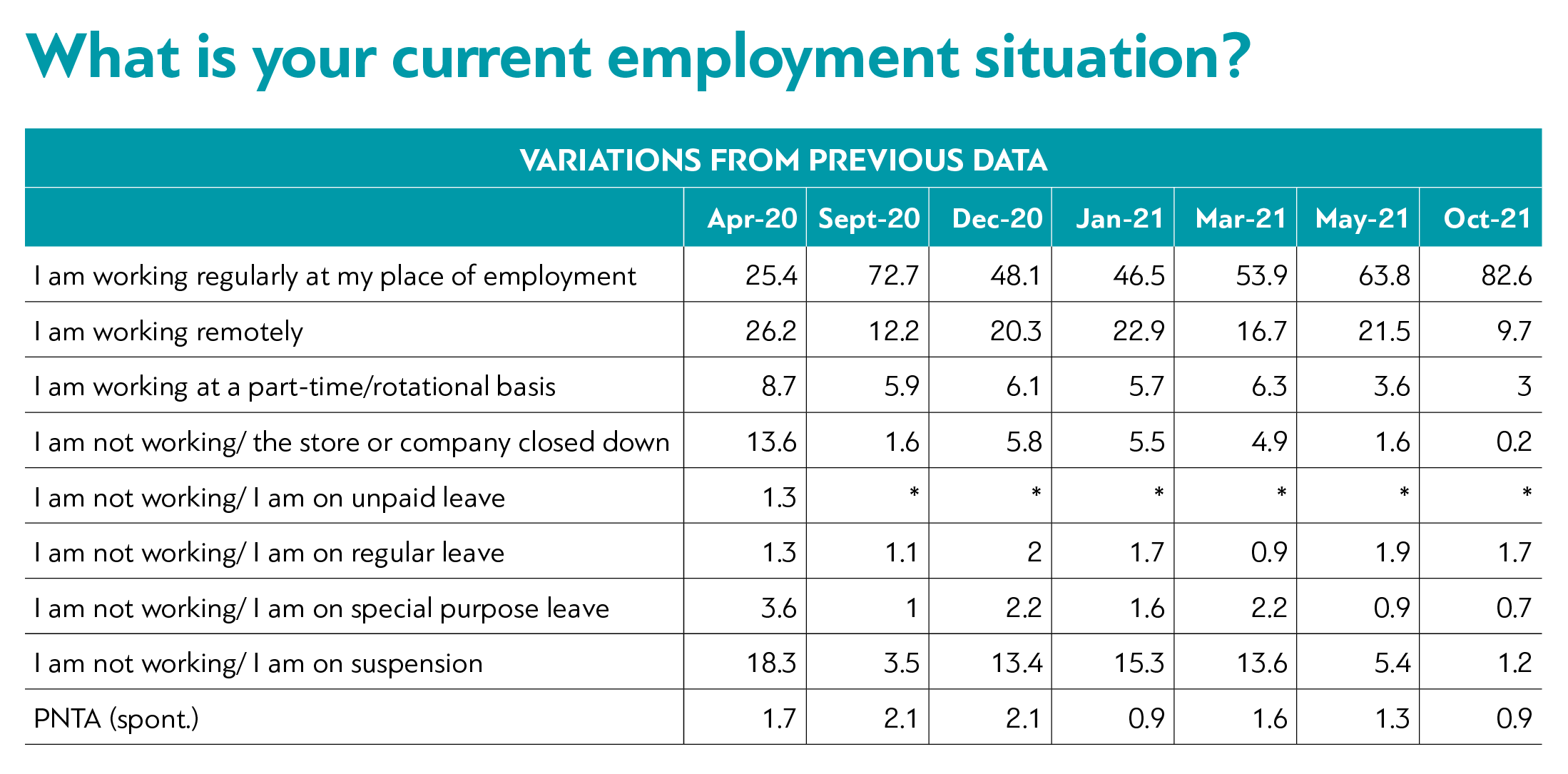
Greek citizens are, however, divided into two groups: half of us believe that our country is headed in the right direction, while the other half believe the opposite to be true. Nonetheless, things are not so clear-cut, when it comes to population sub-groups. A crucial factor that differentiates the data is age: citizens aged over 65 who believe we are on the right track are more than twice as many as their peers who believe the opposite to be true. In the age group 17-39, however, the percentages are inverted. Younger people generally have a more pessimistic outlook on nearly all topics related to the pandemic; something that is confirmed by other studies. This subject deserves further investigation. It is also worth mentioning that half of our vaccinated citizens believe we are headed in the right direction, while 7 out of 10 unvaccinated citizens believe we are headed in the wrong direction.
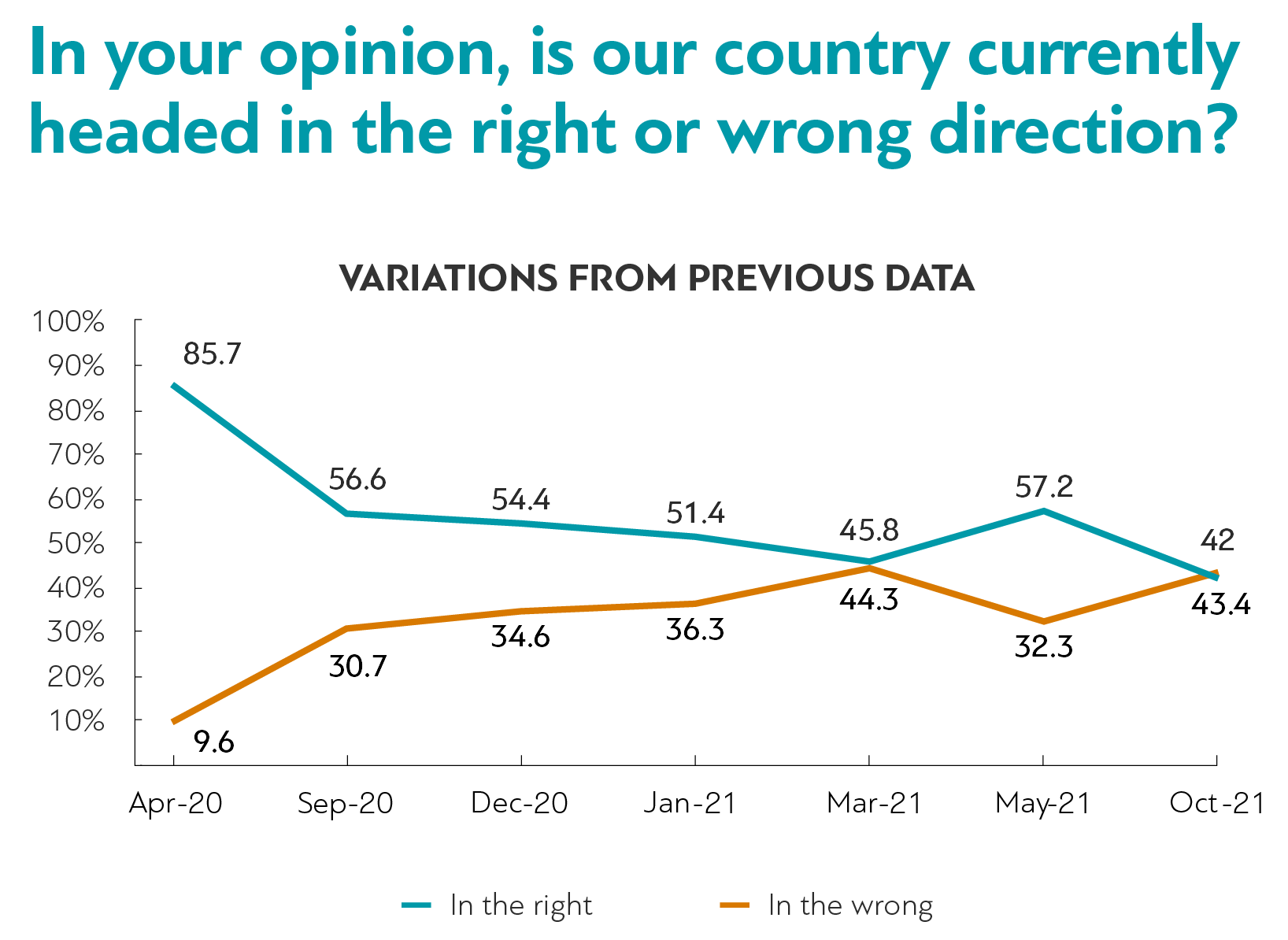
The predominant emotions of Greek citizens remain stable: uncertainty (40%) and insecurity (31%) take the lead and shame (7%) and confidence (5%) finish last.
In general, as can be seen from previous surveys, the majority of Greeks take the threat of Covid-19 very seriously. 3 out of 4 Greeks consistently view Covid-19 as a "serious threat" to their health and well-being —only 1 in 5 consider it to be a "common and unexceptional disease". Here, too, of course, there is a significant difference between the vaccinated and unvaccinated: 13.5% of vaccinated people believe it is but a "common flu" —the equivalent percentage in the unvaccinated populace is 51.2%.
The pragmatism in their stance, is of course, also due to the fact that their early expectations for a smooth and swift return to normalcy were never met. As the crisis took on full steam in April 2020, the majority of Greeks held the belief that we would be returning to "normalcy" by September of the same year. As time passed, however, a new pragmatism prevailed and as of today, half of our population (47%) believes we will return to "normal day-to-day routine" after 2022.
Even so, even before the emergence of the "omicron" variant, 65% of Greek nationals consider "very" or "quite" probable that new variants will lead to the pandemic getting worse again in the future. As things stand, approximately 2 out of 3 Greek citizens find it "not that probable" or "not at all probable" that we will enter a new lockdown phase (while nearly half of the unvaccinated hold the exact opposite view). Meanwhile, 2 in 3 Greeks believe that "the worst is behind us" and only 1 out of 4 consider that "rougher days lie ahead". The outcomes of these questions are more-or-less the same, regardless of age —and nearly identical for the vaccinated vs unvaccinated.
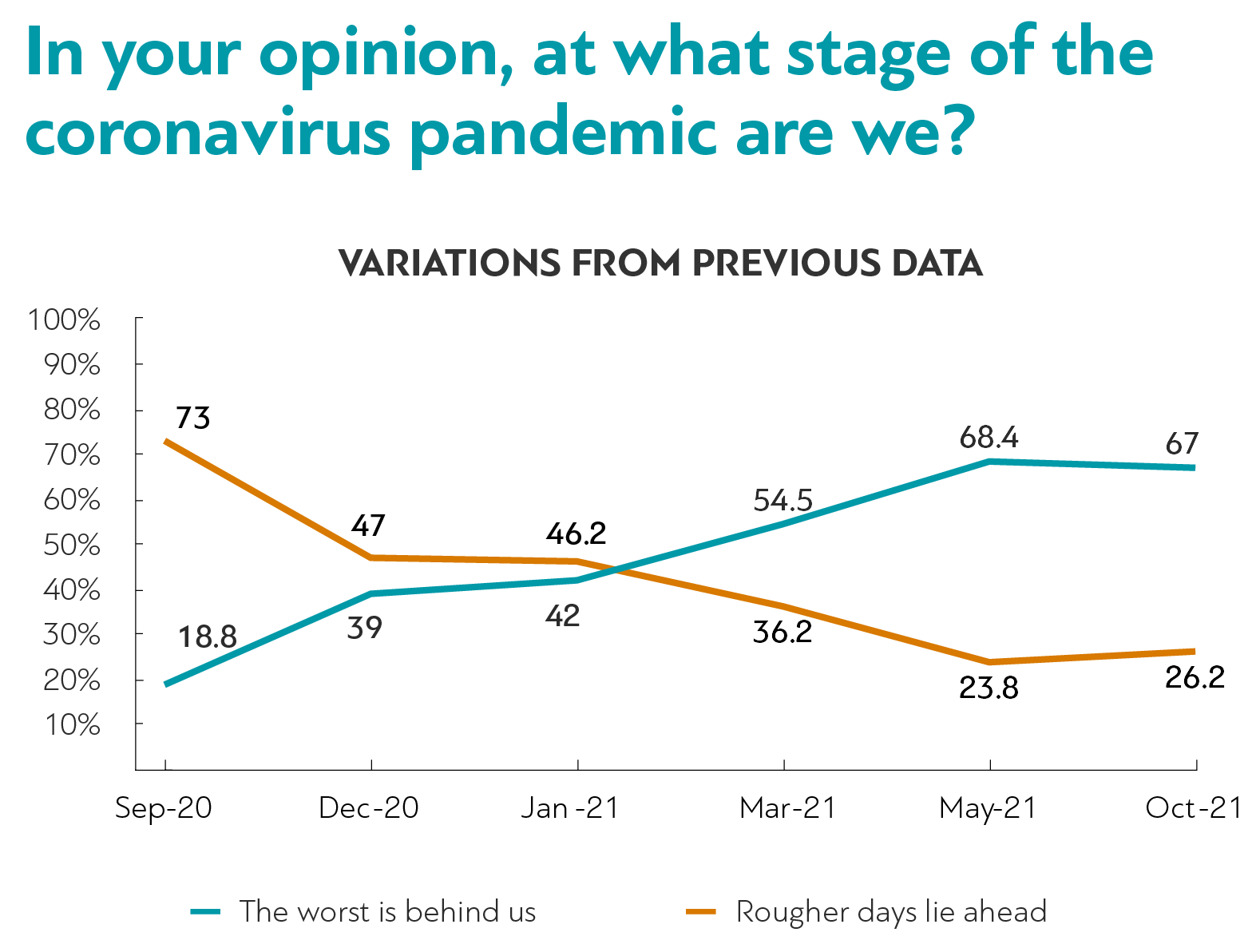
2. At the time the survey was conducted, 9% of Greeks claimed they had fallen ill to Covid-19 (compared to 6% in May of 2021). At the same time, 77% of the research sample (which contains Greek-speaking respondents aged 17+ only) declare they have received at least one vaccine jab (compared to 39% in May of 2021), while 75% declare they are fully vaccinated. Of those vaccinated 81% say that they will receive the booster jab as soon as it becomes available to them. Interestingly, the percentage of those willing to receive the supplementary shot is very high for all age groups —including those aged 17-24 (77%).
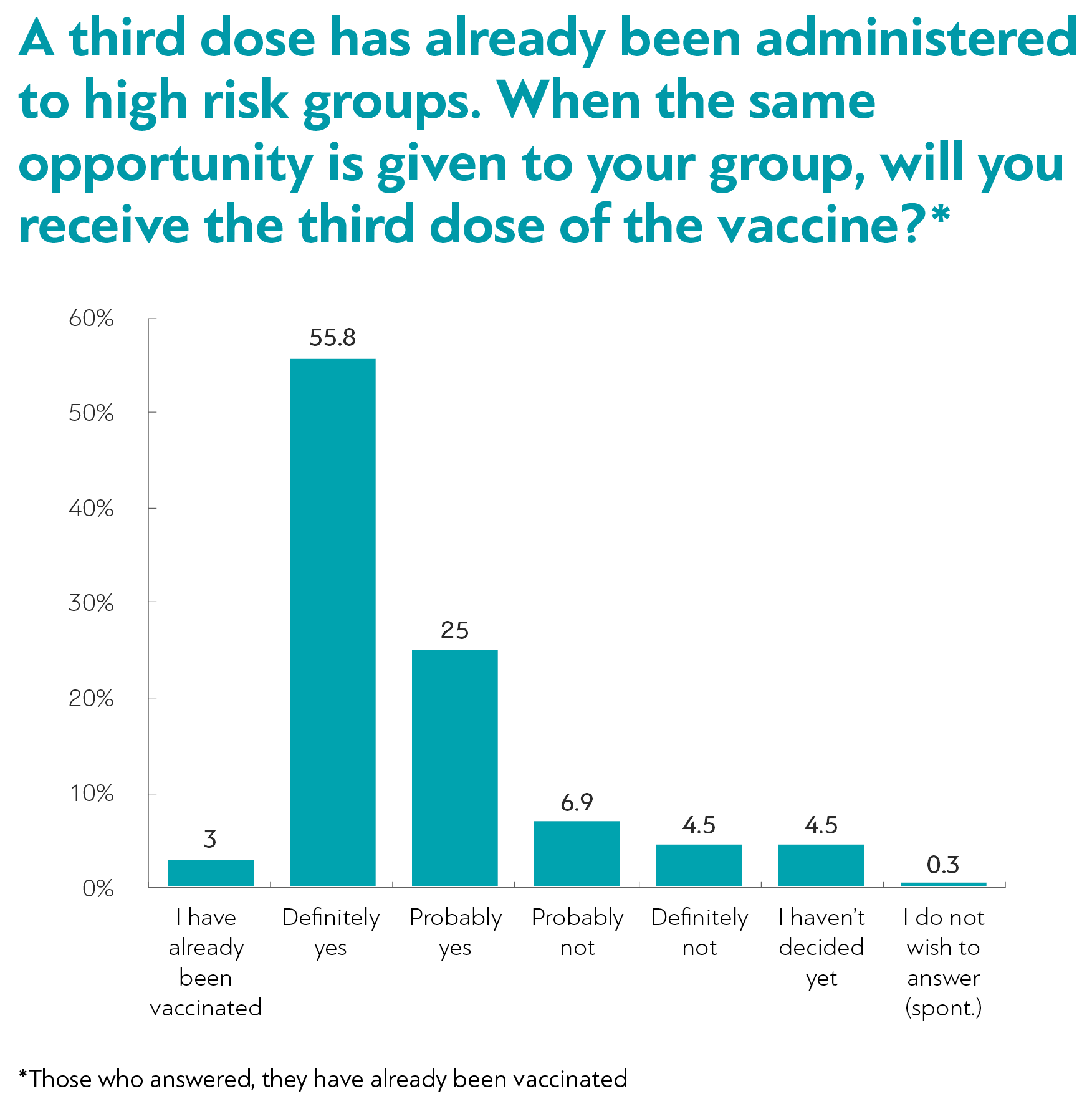
As can be deduced from the research results, the percentage of those vaccinated increases accordingly with age and educational level. Vaccination percentages of 65% or below can only be found in certain population groups like farmers, the unemployed and those who live in regions with fewer than 2,000 inhabitants.
In this survey we also included some new questions on the subject of vaccination. Of those who have been vaccinated against Covid, 58% declare that they arrived at this decision alone. 1 in 4 say that they were urged to do so by their doctor. Also, 1 out of 4 vaccinated respondents say that they were initially against vaccination, but eventually changed their mind.
Respectively, for the unvaccinated populace (23% of the whole), the same percentage (58%) declare that they arrived at this decision -to not receive the jab- on their own accord. 1 in 5 say that they were influenced "by all they had read or heard", and 1 in 10 were "urged not to get it by their doctor". Half of this unvaccinated 23% say that they had decided against vaccination from the outset.
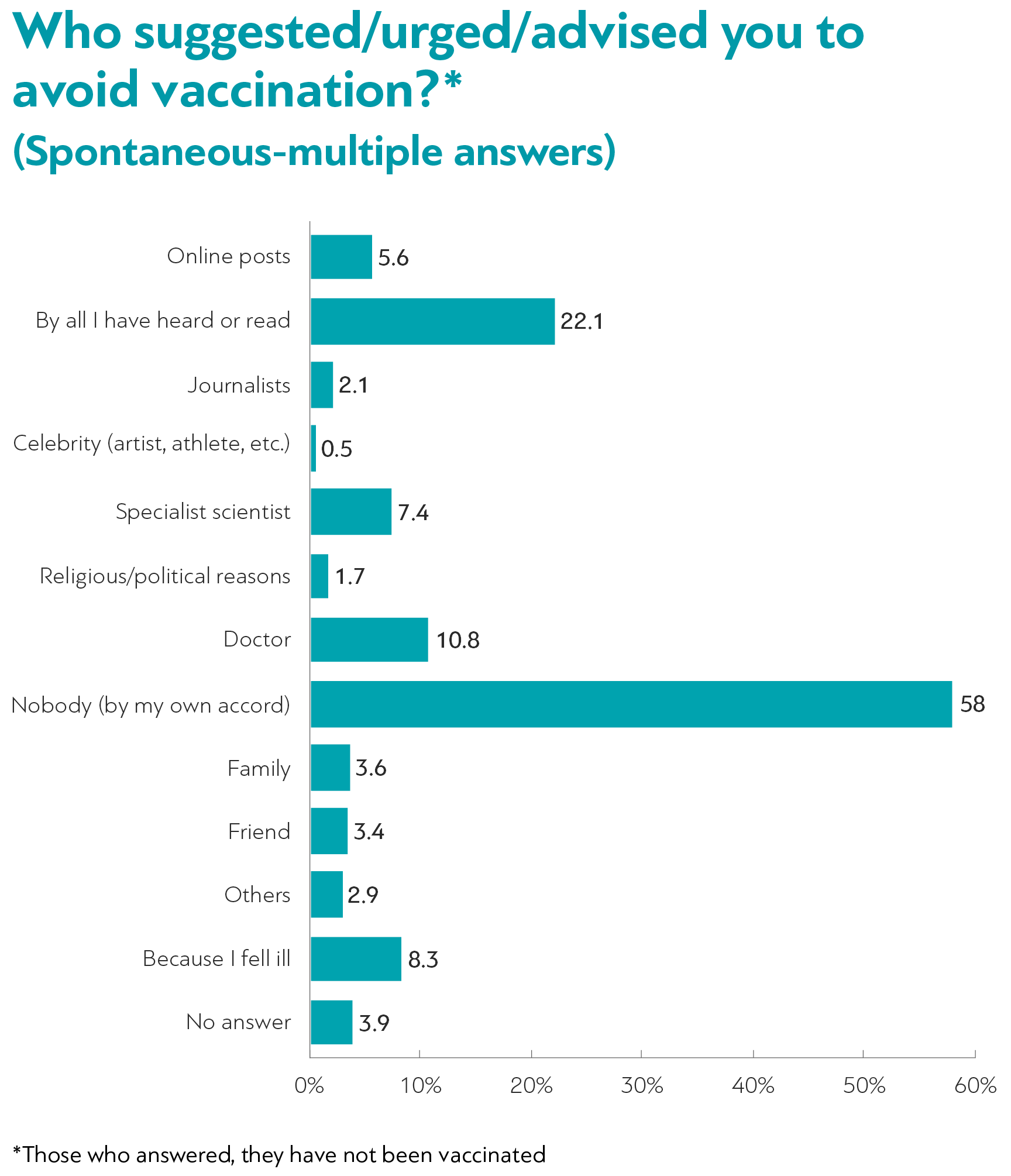
More than half of those who are not vaccinated insist that they will not be vaccinated ("probably not" and "definitely not") in the future either. That amounts to about 15% of the overall research sample. And when they were asked if they will accept to get vaccinated if that becomes mandatory for all citizens, 41% of the unvaccinated (which corresponds to about 800,000 citizens) say that they would continue to refuse to do so.
On the subject of compulsory vaccination and the rights of the vaccinated/unvaccinated in society, some interesting results show up. The vast majority of citizens are pro-compulsory vaccination when it comes to certain groups. 7 out of 10 citizens believe that vaccination should be compulsory for educators; another 7 out of 10 are of the same opinion for members of the military; while 3 out of 4 believe vaccines should be mandatory for healthcare professionals. Having said that, just over half of the total sample are of the opinion that vaccination should be mandatory for all citizens.
7 out of 10 vaccinated citizens maintain that their unvaccinated fellow citizens "are not properly informed" and that "unscrupulous professionals are consciously misdirecting and manipulating them". 6 out of 10 are convinced that "their behavior is anti-social" and 4 out of 10 that "they are dangerous and should be avoided". However, 7 out of 10 vaccinated citizens believe that unvaccinated people "have the right" to not receive vaccination.
Half of our respondents say that citizens have the right to request services exclusively from vaccinated employees —the other half disagrees.
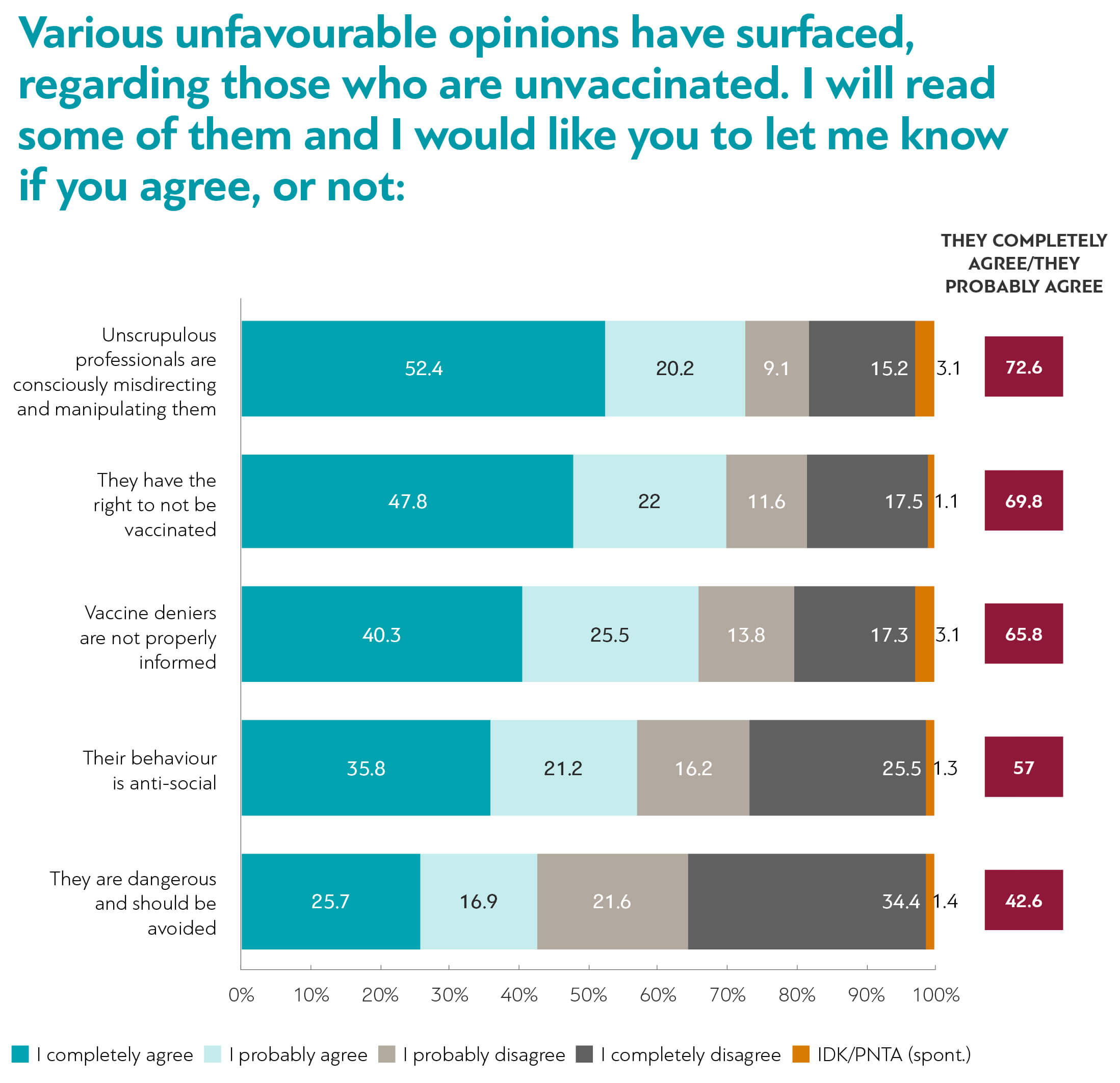
Αttitudes towards the vaccination of children are also interesting. In May 2021, just before the EMA approved the use of vaccines for children aged 12+ in Europe, 58.1% of Greek parents were saying that they would not vaccinate their kids. Today, however, 6 out of 10 parents of children aged 12+ say that their children have either already been vaccinated (38%) or are getting the vaccine soon (20%).
The survey took place before vaccines were approved for children younger than 12 in the EU and, at that time, only 1 in 3 parents of younger children aged under 12 stated that they were planning to vaccinate them when approvals arrived. 1 in 5 maintained that they haven't decided yet, and nearly half (46%) claimed that their children would not receive the jab. Since then, the vaccines were approved in the EU as well, and vaccinations of children aged 5-11 have already started.
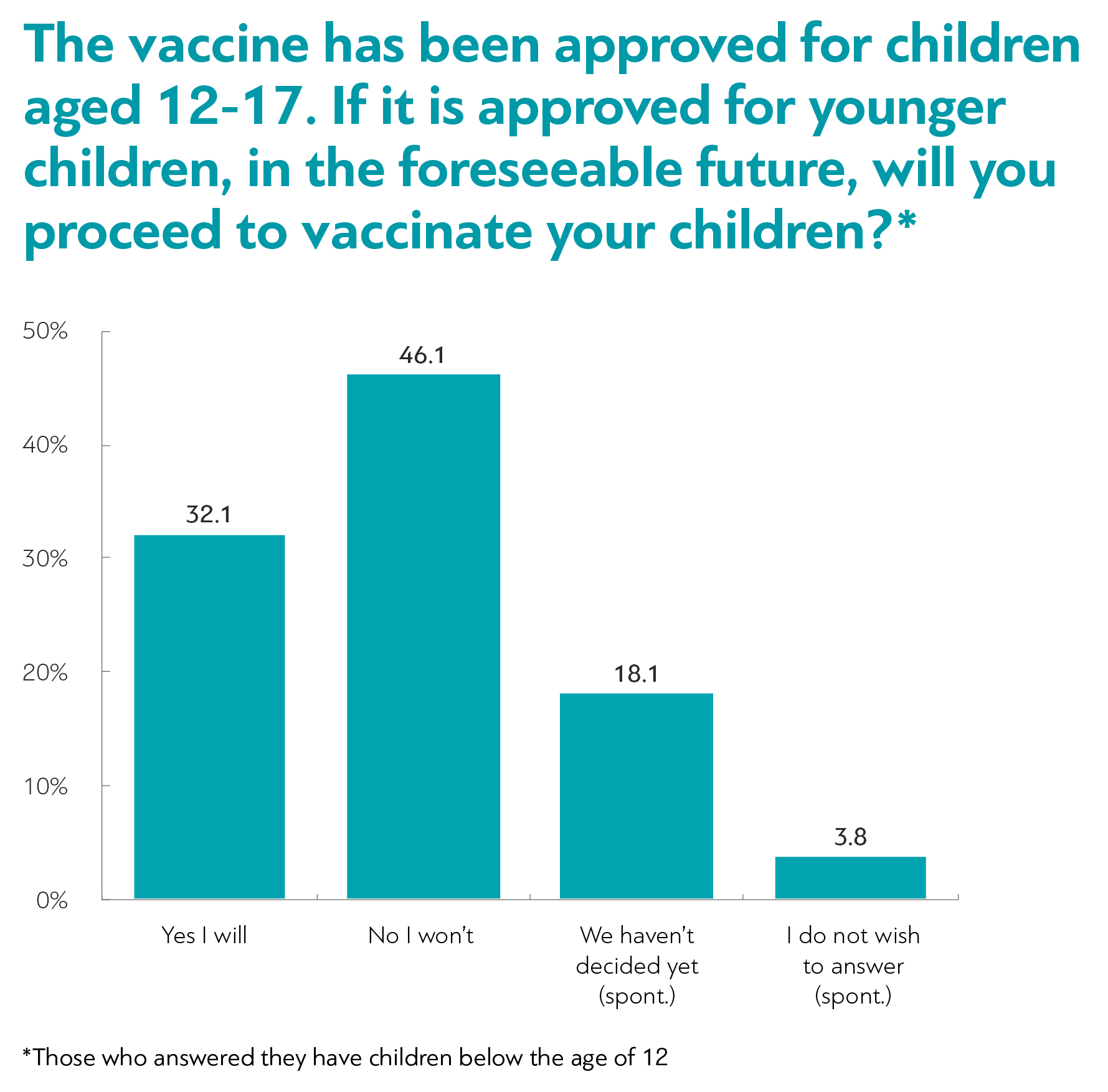
3. As already mentioned in the introduction, a series of questions on the mental and physical wellbeing of Greeks in these last 20 months were incorporated in this survey —and were compared to corresponding data from the pre-pandemic period. An analysis of these results can be found (in Greek) here. Notably, 1 in 4 Greek men and women say that in the last 12 months they have dealt with anxiety disorders (panic attacks, stress). 1 out 10 say that they have gone through depression. 1 out of 5 claim that during the last 2 weeks, they experienced sleep disorders, and another 1 in 5 that they have felt melancholic, depressed, or hopeless —a percentage almost twice as large as that of a similar survey by ELSTAT in 2019. Variations due to age are profound here as well. 44% of young Greeks aged 17-24 say that they experienced melancholia, depression, or hopelessness this past year.
From these results, which can be studied in detail (in Greek) here, it becomes clear that the consequences of this crisis are far-reaching and profound, and that they will continue to shape the economic and social wellbeing of Greeks for a long time to come.
